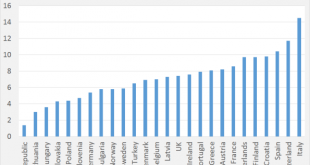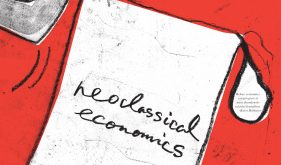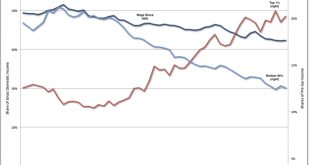Eurostat made new data on broad unemployment available. For some countries (Ireland, Greece, Switzerland), these show a less rosy picture than the ‘normal’ unemployment data. Only the Czech Republic has low normal as well as low broad unemployment though Poland, Hungary, Bulgaria (!) and Germany seem to be heading that way. Altogether, labor slack is still immense. At this moment, wage increases are still low in non-Eastern European countries. Considering the slack this might stay so for...
Read More »The Volatility Index and Heisenberg’s uncertainty principle
from Donald MacKenzie and the London Review of Books The VIX, or Volatility Index, is Wall Street’s fear gauge. I first started paying attention to it in the late 1990s. Back then, a level of around 20 seemed normal. If the index got to 30, that was an indication of serious market unease; over 40 signalled a crisis. The highest the VIX ever got was during the 1987 stockmarket crash, when it reached 150. In the 2008 global banking crisis, it peaked at just below 90. The US economy has...
Read More »Neoclassical economics is great — if it wasn’t for all the caveats!
from Lars Syll I think that modern neoclassical economics is in fine shape as long as it is understood as the ideological and substantive legitimating doctrine of the political theory of possessive individualism. As long as we have relatively-self-interested liberal individuals who have relatively-strong beliefs that things are theirs, the competitive market in equilibrium is an absolutely wonderful mechanism for achieving truly extraordinary degree of societal coordination and...
Read More »What Martin Sandbu gets wrong about neoclassical macro-economics
Martin Sandbu is, in the Financial Times, wrong about neoclassical macroeconomic models. Let me explain by responding to his text, paragraph by paragraph. No links, I might add these later. What do macroeconomists actually do? Without an answer to that question, it is difficult to articulate what they might be doing wrong. The rebuilding macroeconomic theory project is useful also to non-economists — perhaps especially to them — because it takes the time to dwell on how macroeconomists do...
Read More »What’s the matter with America?
from David Ruccio Last week, Thomas Frank welcomed Paul Krugman to the ranks of those who believe that the American working-class in recent decades has often voted against its fundamental economic interests by supporting conservative Republicans. Appropriately enough, Frank then chastises Krugman for having repeatedly used his New York Times column to argue exactly the opposite, denying the idea that working-class Americans had defected to the Republican Party. Frank, the author...
Read More »Simon Wren-Lewis — anti-pluralist mainstream flimflam defender
from Lars Syll Again and again, Oxford professor Simon Wren-Lewis rides out to defend orthodox macroeconomic theory against attacks from heterodox critics. In his latest attack on heterodox economics and students demanding pluralist economics education he writes: The danger in encouraging plurality is that you make it much easier for politicians to select the advice they like, because there is almost certain to be a school of thought that gives the ‘right’ answers from the politicians...
Read More »Former AIG director Martin Feldstein warns of stock and housing bubbles
from Dean Baker That’s one of the things we learn from reading Robert Samuelson’s Washington Post columntoday, although Samuelson identifies Feldstein only by his professorship at Harvard, not his moonlighting work on AIG’s board. (In addition to requiring a massive government bailout during Feldstein’s tenure as a director, AIG was also rocked by an accounting scandal that forced the resignation of its Maurice Greenberg, its longtime CEO.) I’m one of those old-fashioned types who think...
Read More »Prosperity as human development, not wealth
from Asad Zaman The main thesis of our lecture is that our quest for prosperity has failed to deliver the sought-after goals because we have misunderstood the meaning of prosperity , and looked for it where it cannot be found. We base our economic policies on modern economic theory, which is based on the amazing assumption that human beings act to maximize lifetime consumption, since this is the sole source of human welfare. Human beings are far more generous and cooperative than the...
Read More »Trump trashes the United States while Xi tries to build a “sustainable China”
from Richard Smith and issue 82 of the RWER As Trump walked away from the Paris climate accord, Xi announced his intention to “take the driver’s seat in international cooperation to respond to climate change”. Not only that but Xi’s government has also pledged to wipe out the last vestiges of poverty in China by 2030 and turn China into a “moderately prosperous society” where the basic needs of all including jobs, housing, and healthcare, are met. Trump, as we know, has different...
Read More »Dani Rodrik’s Ten Commandments
from Lars Syll Dani Rodrik is not satisfied with the critique of mainstream economics put forward by yours truly and other mostly non-orthodox economists. So he has put up a list of ten commandments for economists, hoping thereby to somehow ‘save’ mainstream ‘the model is the message’ economics from the critique. The two central commandments are 3. Make your model simple enough to isolate specific causes and how they work, but not so simple that it leaves out key interactions among...
Read More » Real-World Economics Review
Real-World Economics Review





